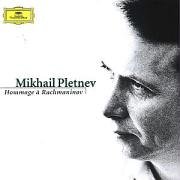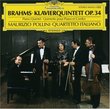| All Artists: Sergey Rachmaninov, Ludwig van Beethoven, Felix [1] Mendelssohn, Frederic Chopin, Mikhail Pletnev Title: Hommage � Rachmaninov Members Wishing: 1 Total Copies: 0 Label: Dg Imports Release Date: 4/13/1999 Album Type: Import Genre: Classical Styles: Chamber Music, Forms & Genres, Concertos, Sonatas, Historical Periods, Classical (c.1770-1830), Modern, 20th, & 21st Century, Romantic (c.1820-1910), Instruments, Keyboard Number of Discs: 1 SwapaCD Credits: 1 UPC: 028945963426 |
Search - Sergey Rachmaninov, Ludwig van Beethoven, Felix [1] Mendelssohn :: Hommage � Rachmaninov
 | Sergey Rachmaninov, Ludwig van Beethoven, Felix [1] Mendelssohn Hommage � Rachmaninov Genre: Classical
|
Larger Image |
CD DetailsSimilarly Requested CDs
|
CD ReviewsAn excellent recital on a beautiful instrument Michael Whincop | GRIFFITH UNIVERSITY, QLD AUSTRALIA | 03/09/2001 (5 out of 5 stars) "I listened to this recital back-to-back with Pletnev's live Carnegie Hall concert, as part of my reacquaintance with this pianist's art after a lengthy disenchantment with him. I am delighted to report how much I enjoyed this disk. The idea of the disk is novel, but in no sense a gimmick -- Rachmaninov's piano has a glorious sound, particularly in its middle registers, and the acoustic is perfect for these pieces. As a general comment, Pletnev's approach is big, bold, and colourful. He usually opts for broad tempi, in which he is most particular to bring out details and emphases neglected in other readings.The Corelli Variations is not the finest piece Rachmaninov ever wrote, but in such an opulent, expansive interpretation it is pretty hard to resist. Pletnev sounds quite sensuous in caressing the lyrical themes, and displays his rich palette in the animato passages. The Beethoven is surprisingly chaste -- it certainly gleams with colour and bristles with virtuosity but there are no rhetorical gestures or pacing. The first movement is genuinely tinged with sadness without being mawkish, and the third movement is wonderfully alive and bouyant. The Mendelssohn pieces are played with charm and wit, and the Andante spianato is played with glorious lyricism -- I cannot think of another recording of this work in which the pianist demonstrates such wonderfully rounded legato. I confess I find the polonaise a bit too long for its own good, but Pletnev proves an able guide here, too. To close the disk, Pletnev returns to the piano's owner's music, giving us three op. 33 and one op. 39 etudes. Again, his pacing is quite broad -- he never drives these works too hard, conjuring an aura of Russian melancholy from their polyphonic textures. I compared with interest his performance of the famous op. 39/5 in this and the Carnegie Hall concert. I prefer this reading. It is in fact the quicker performance, most noticeably so in the earlier part of the work. Throughout his control and attention to detail are astonishing.Highly recommended." In Praise of Older Pianos brent taylor | Indianapolis, Indiana | 04/13/2002 (5 out of 5 stars) "I recently returned to this recording after the release of Pletnev's live Carnegie Hall recital and it continues to amaze me. Using Rachmaninoff's own restored 1933 Steinway was indeed a daring enterprising and rewarding venture for this artist. So, does an older piano really sound better? It is rather suprising just how different a modern concert grand from 1933 sounds from one of more recent vintage. Pletnev capitalizes upon the differences in his recital of works which Rachmaninoff himself played in recital but did not record. If not better sounding it certainly is a very interesting aural experience. Compare this performance of the E flat-minor Etude-Tableaux with the new live performance and the criticism of under pedalling voiced by one reviewer makes sense; Pletnev is here playing in a smaller very dry acoutic--not Carnegie Hall. It is rather like being in the Horowitz living room; there are some acoustic drawbacks. Nevertheless the artistic merits here and indeed the spirit of the surroundings--Rachmaninoff's piano in his own house-- prevails. Fans of this pianist and of the composer-pianist himself will not be disappointed." Pletnev Astounds A. Smith | Vancouver, Canada | 02/27/2000 (4 out of 5 stars) "Sergei Rachmaninov's Steinway still sits in the study of his former Villa Senar, in Switzerland. It is in this study, and on this piano, that Mikhail Pletnev performed for Deutche Grammophon in the summer of 1998.Pletnev's gentle, yet commanding touch on Rachmaninov's Variations on a Theme of Corelli, op.42 and 4 Etudes-Tableaux, at times evokes images of the master himself. Although the disc begins and ends with these Rachmaninov works, Pletnev provides impressive measures of Beethoven, Mendelssohn and Chopin in between.But perhaps the most memorable moments come during Chopin's Grande Polonaise brillante. At times, Pletnev's masterful touch sweeps us through the piece with a speed and brilliance that are nothing less than breathtaking. Murray Perahia's 1989 Sony recording of Chopin's F-minor Concerto No. 2 for piano and orchestra, op.21, offers similar light-handed acrobatics, particularly in the Larghetto, but with this Grande Polonaise, Pletnev truly exceeds.In all, this disc is a real treasure."
|

 Track Listings (35) - Disc #1
Track Listings (35) - Disc #1![The Ink Spots - The Greatest Hits [MCA]](https://nationalbookswap.com/cd//m/61/4061/24061.jpg)



![Frida [Music from the Motion Picture]](https://nationalbookswap.com/cd//m/64/2164/612164.jpg)




